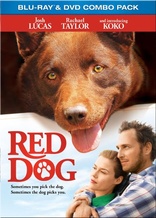Red Dog Blu-ray Movie
HomeRed Dog Blu-ray Movie 
Blu-ray + DVDArc Entertainment | 2011 | 92 min | Rated PG | Nov 06, 2012
Movie rating
7.2 | / 10 |
Blu-ray rating
| Users | 3.5 | |
| Reviewer | 4.0 | |
| Overall | 3.8 |
Overview
Red Dog (2011)
Based on the legendary true story of the Red Dog who united a disparate local community while roaming the Australian outback in search of his long lost master.
Starring: Josh Lucas, Rachael Taylor, Noah Taylor, Luke Ford, Arthur AngelDirector: Kriv Stenders
| Family | Uncertain |
| Comedy | Uncertain |
| Drama | Uncertain |
Specifications
Video
Video codec: MPEG-4 AVC
Video resolution: 1080p
Aspect ratio: 2.35:1
Original aspect ratio: 2.39:1
Audio
English: DTS-HD Master Audio 5.1
Subtitles
English SDH
Discs
25GB Blu-ray Disc
Two-disc set (1 BD, 1 DVD)
DVD copy
Packaging
Slipcover in original pressing
Playback
Region A, B (C untested)
Review
Rating summary
| Movie | 4.0 | |
| Video | 4.5 | |
| Audio | 3.5 | |
| Extras | 2.5 | |
| Overall | 4.0 |
Red Dog Blu-ray Movie Review
Local Hero
Reviewed by Michael Reuben November 9, 2012You see? Comedy. Love. And a bit with a dog. That's what they want. — Shakespeare in LoveRed Dog is such a quintessentially Australian film that it should probably come with a primer for foreign audiences. There actually was a dog by that name who roamed the rugged area of Western Australia known as Pilbara during the 1970s and had several masters, one of them named John. The mining town of Dampier, where the film is set, has erected a statue in Red Dog's honor. Red Dog was a blend of two Australian breeds, a cattle dog and a Kelpie, which is an Australian sheep dog. Something about the independence of this wilderness spirit caught the popular imagination, and stories, poems and songs about Red Dog became common among local inhabitants. The material was enough to fill two books, one published in 1983 by Nancy Gillespie and a second ten years later by Beverly Duckett. Legend soon followed. In 2002 British author Louis de Bernières published a novel, Red Dog, inspired by the tales of the "Pilbara Wanderer". The novel invented a new and dramatically more coherent biography for the historical canine, which screenwriter Daniel Taplitz then reimagined for a film ten years later. Taplitz's script, aided by Kriv Stenders' expansive direction, returns Red Dog's story to its roots in modern folklore, as residents of Dampier gather at the local pub and recount tales of the legendary wanderer's exploits and adventures. In the process, Red Dog becomes as much a symbol of Australia as any archetype presented by Baz Luhrman, Peter Weir or Bruce Beresford. This four-legged citizen seems more at home in this vast, untamed landscape than many of his human companions. And what a landscape it is. Stenders made the wise choice to let the imposing, austere vistas of Western Australia dominate the frame whenever possible. No travelogue could ever make as eloquent an advertisement for the character of a land or its people as does Red Dog for the democratic spirit of Australia. Maybe that's why the film has been so popular there, winning awards and setting records at the box office and on DVD, only to fizzle everywhere else. In the U.S., it's being released direct to DVD and Blu-ray. The latter format is how it should be seen, simply because the imagery is gorgeous. Once you tune into its distinctive frequency, it's also an entertaining story, with several mini-stories folded inside.
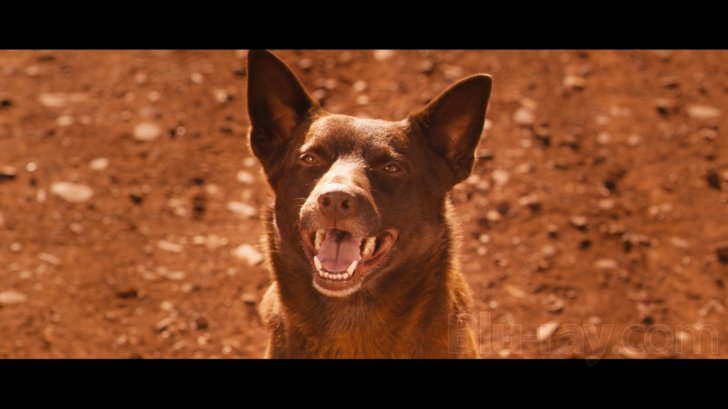
Red Dog is told mostly in flashback, as local townspeople gather at the pub in Dampier owned by Jack Collins and his wife, Maureen (Noah Taylor and Loene Carmen). A trucker named Thomas (Luke Ford) arrives one night with a load that will turn out to be a statue of the town founder, William Dampier. Thomas finds the pub nearly deserted, because all of the patrons are gathered out back, ministering to an ailing Red Dog, whose stories they proceed to relate, as one might share memories of a dear and deeply respected friend. Dampier is a mining town where everyone works for Hamersley Iron. It's remote, isolated and surrounded by desolate beauty as far as the eye can see. As Jack Collins said to Maureen, when they first drove into town to take over the pub in 1971, people only go there because they can make money. It was then that they first met Red Dog, sitting in the road, forcing them to stop so that he could hop aboard to hitch a ride. That's how he prefers to travel—but he only stops the vehicles owned by people he likes. Red Dog is fussy that way. Red Dog makes himself at home in Dampier's melting pot, where men have been attracted from all over the world by the prospect of work. Homesickness is common, as exemplified by Vanno (Arthur Angel), an Italian who talks incessantly about his home town of Abruzzi, to the point where his co-workers want to throttle him. Others have come to Dampier to get away from tragedy, men like Jocko (Rohan Nichol), who has a downcast demeanor and says very little, until one day an unusual encounter with Red Dog and a shark shock him into becoming a member of the community. A companion to everyone and no one, Red Dog roams without a master until John Grant (Josh Lucas), an American, takes a job driving a bus for the miners to and from their work site. (In the commentary, director Stenders notes that the name is a deliberate reference to the 1971 Australian pulp classic, Wake in Fright.) The story of Grant and Red Dog is a comic courtship, in which the dog chooses its master, but the pair becomes a triangle with the arrival of an executive secretary, Nancy Grey (Rachel Taylor), whose youthful beauty is utterly out of place in this land of dust and grime. The scene where Nancy boards John Grant's bus on her first day, then must choose between sitting next to one of the miners or making Red Dog share his seat, is a comic gem. By crosscutting in time, mixing voices of various narrators and using an impressive array of behaviors coaxed out of the dog, Koko, who plays the title character—Koko's training is shown in the extras—director Stenders establishes Red Dog firmly as the film's lead. He is, after all, the title character, and everyone else plays a supporting role: John Grant, Nancy Grey, the Collins couple, Vanno and the veterinary nurse, Rose (Keisha Castle-Hughes of Whalerider), with whom he falls in love. Even the brute known as Peeto (John Batchelor), who makes a memorable impression in numerous scenes, remains a secondary character revolving around the singular canine whose legend grows with each passing year. What accounts for the disparity between Red Dog's enormous popularity at home and the indifference of its reception abroad? I suspect that the lack of familiarity with a local Australian tale accounts for much of it. In the U.S., we tend to forget just how many of our cultural touchstones have been seeded throughout the world by a century of Hollywood exports, while we haven't received, or haven't allowed, a similar flow in the other direction. (Think of it as a cultural trade imbalance.) Precisely because viewers outside of Australia aren't familiar with the character of Red Dog, they are surprised when the film turns out to be so much less sentimental than one would normally expect from a film with a dog for a hero. But sentiment wouldn't suit Red Dog, any more than it would Mad Max. He is a self-sufficient loner guided by his own code of conduct, a dog of honor not emotion, a fighter not a lover (just ask his arch-nemesis, the Dampier feline known as Red Cat). Both the script and the direction inoculate Red Dog against an excess of sentiment by styling much of the film as a comedy, and a broad one at that. Physical comedy is a big part of Red Dog's tale, e.g. Vanno's courtship of Rose or the revelation that one of the roughest, toughest he-men in town has an unusually dainty hobby (you'll have to see the film to find out what). And Red Dog doesn't shy away from gross-out humor either, though it's relatively tame; a running gag concerns the title pooch's flatulence, which is so vile that every motorist who gives him a ride ends up pulling over to the side of the road gasping for air. Silly moments like these make the film's unexpectedly dramatic turns strike with greater impact, as life's most serious developments often do.
Red Dog Blu-ray Movie, Video Quality 
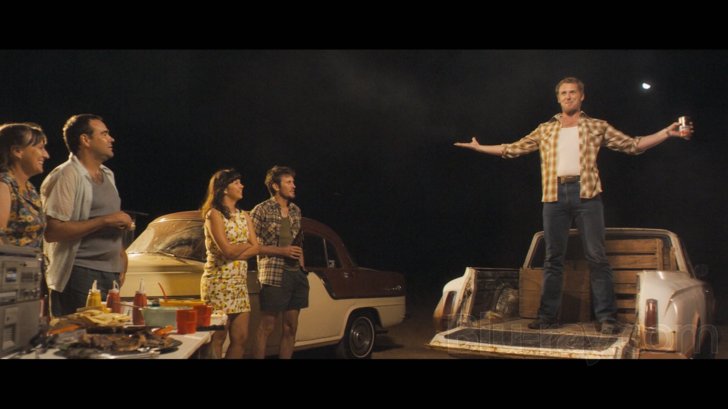
IMDb says that Red Dog was shot in the Red digital format, and nothing in the film's credits indicates otherwise. Certainly the image on ARC Entertainment's 1080p, AVC-encoded Blu-ray reflects the clarity, detail and depth associated with digital capture. Cinematographer Geoffrey Hall (Chopper) has designed Red Dog not only as a narrative about the Pilbara Wanderer of the title, but also as a tribute to the landscape of the character's adventures. The film is graced with shot after breathtaking shot of bold, expansive landscapes conveying both the rugged natural beauty of Western Australia and the massive scale of the mining operations that provide work for the diverse independent spirits who come to call it their home. The Blu-ray's colors are varied and beautifully saturated, and its black levels are deep and accurate without crushing. There is occasional light banding on some of the solid expanses of color, but I doubt anyone will see it unless they're actively looking for it. A travelogue seeking to lure tourists to Pilbara could not make it look more enticing than Red Dog, but the film has the extra attraction of telling an intriguing story to accompany the scenery. At 92 minutes, and with extras that are relatively short, the film compresses onto a BD-25 without visible problems.
Red Dog Blu-ray Movie, Audio Quality 
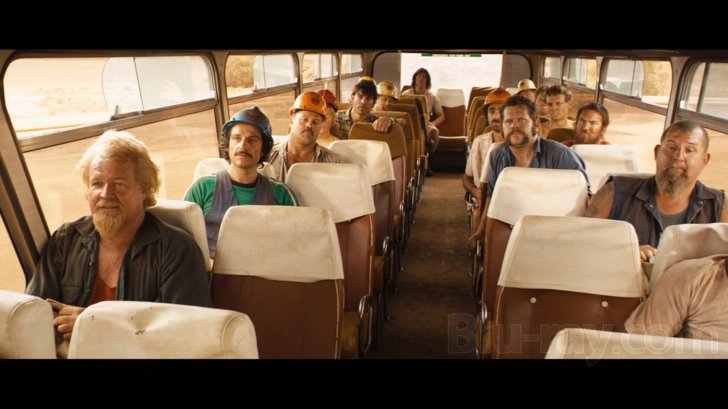
Although it is a contemporary production, Red Dog features a DTS-HD MA 5.1 track that is fairly restrained when it comes to surround activity. It provides environmental ambiance and expands the surround field occasionally (e.g., in a large crowd scene in the Collins pub involving a wager), but in general the mix is front-oriented. It's a capable mix with clear dialogue and a jaunty, country-inflected score by Cezary Skubiszewski. Also essential to the soundtrack are some well-chosen pop songs designed to situate the story in the recent past, including "Stumblin' In", performed by Suzi Quatro; "Jump Into the Fire", performed by Harry Nilsson; and "Let My Love Open the Door", performed by Pete Townshend.
Red Dog Blu-ray Movie, Special Features and Extras 

- Commentary with Director Kriv Stenders and Producer Nelson Woss: Stenders and Woss recorded this commentary in September 2011, while Red Dog was still in Australian theaters, and their commentary is buoyed by the enthusiasm of the film's reception. They recount the fairly short history of the film's development, after a minor bidding war between Woss and Dreamworks. (Woss won, because Dreamworks made the mistake of telling author Louis de Bernières that they planned to change the setting to America.) Stenders points out which portions were filmed on location in Dampier and which in Adelaide, and also discusses the casting search that led to Koko.
- Deleted Scenes (1080p; 2.35:1):
- Jocko (3:44): An alternate version of the story that Jocko tells in the bar.
- Humping (0:52): Regarding Red Dog's own love life.
- Interview (0:41): John Grant's job interview.
- Cribs Depart (0:31): Farewell to some unwelcome residents.
- Koko's Screen Test (1080i; 1.78:1; 1:51): Portions of this mock audition are incorporated into the "making of" feature below, as well as the "training footage" featurette. It's a perfect deadpan parody.
- Making of Red Dog (480i; 1:78:1; 10:30): Although this EPK relies too heavily on clips from the film, it also includes interviews with Lucas, Taylor, Stenders, DP Geoffrey Hall and Koko's trainer, Luke Hura.
- Storyboards (1080p; n/a; 6:57): Side-by-side comparison of selected storyboards with the finished scenes in the film.
- Training Footage (1080i; 1.78:1; 4:33): A featurette about Hura's training routine with both Koko and Sevy, who was the runner-up for the part of Red Dog.
- Trailer (1080p; 2:35:1; 2:21).
- Additional Trailers (1080p): At startup the disc plays trailers for Jock the Hero Dog and The Way, which can be skipped with the chapter forward button and are not otherwise available once the disc loads.
Red Dog Blu-ray Movie, Overall Score and Recommendation 
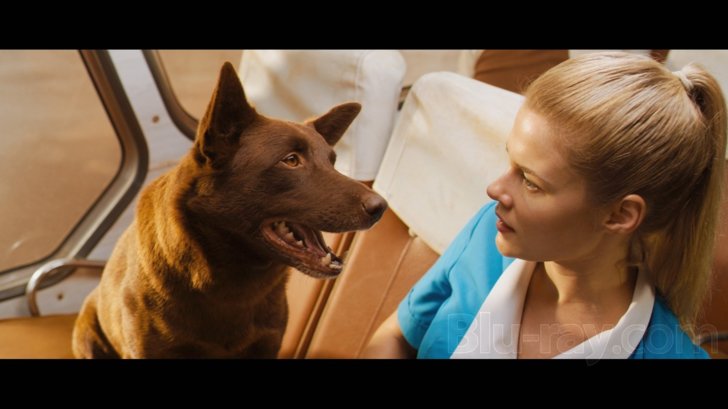
Red Dog may have been a hard sell in a U.S. market where declining attendance has made the entire film industry skittish about theatrical release of anything but the most ironclad franchise properties. However, the film is ideal for the Blu-ray market, where, for a modest investment, the home theater owner can savor its visual pleasures at full theatrical resolution and take the time to fall into its idiosyncratic comic rhythms. If nothing else makes you curious, consider this: The film won the 2012 AFI/AACTA Best Film award, which is the Australian equivalent of the Oscar for best picture. Past recipients include Gallipoli, Breaker Morant, Rabbit-Proof Fence, The Piano and Shine. The most recent previous recipient was the dark and violent crime thriller Animal Kingdom. Never let it be said that Australian cinema can't mix it up with the best of them. Highly recommended.
Similar titles
Similar titles you might also like

Alexander and the Terrible, Horrible, No Good, Very Bad Day
2014

Babe
1995

Candleshoe
1977

Saving Mr. Banks
2013

The Apple Dumpling Gang
40th Anniversary Edition
1975

We Bought a Zoo
2011

A Dog's Purpose
2017

Because of Winn-Dixie
2005

Unsung Hero
2024

The Santa Clause
Anniversary Edition
1994

Treasure Buddies
DVD Packaging
2012

Paddington
2014

Beverly Hills Chihuahua 2
2010

Dr. Dolittle: Million Dollar Mutts
2009

Beverly Hills Chihuahua 3: Viva la Fiesta!
DVD Packaging
2012

Full House: The Complete Series
1987-1995

Gifted
2017

Air Bud: World Pup
2000

Beethoven's Treasure Tail
2014

Jungle 2 Jungle
20th Anniversary Edition
1997
